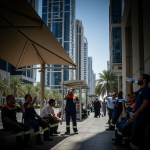For many people who have survived cancer, the hardest part isn’t the medical treatment—it’s what comes after. While the body may heal, many patients are left dealing with deep emotional pain, fear, and anxiety. A UAE-based startup, X-Technology, is now using virtual reality (VR) to help cancer patients deal with this emotional burden.
Founded by Nargiz Noimann-Zander, a long-time expert in psychology and technology, and her son David, X-Technology has created a special VR system designed to help users face their inner fears and emotions in a safe, virtual space.
Healing the Mind, Not the Disease
In a recent interview with Khaleej Times, Nargiz explained their goal clearly:
“We don’t work with cancer. We work with the emotional effects that come with it. We help people process what the diagnosis does to their mental state.”
Instead of focusing on physical treatment, the startup helps people explore their emotions. In one of the VR exercises, the user places the same fear into two glowing spheres floating in space. The goal is to bring these spheres closer together through focused thought. When they merge, they explode into stardust—symbolizing emotional release.
Her son David, who is also the CTO, said,
“It’s all mind-driven. When the fear is merged in both spheres, and you feel a flow—it means you’re making progress.”
25 Years of Work in Mind-Body Technology
Nargiz’s journey began decades ago. In the 1990s, one of her sons had serious heart problems, which made her explore ways to support healing through computer games and technology. In 1997, she opened the Health Centre, bringing together doctors, psychologists, and scientists to explore gentle, evidence-based healing techniques.
Between 1999 and 2003, her team studied how the body reacts emotionally using biofeedback tools. By 2003, they began creating simple video games to help people handle stress and fear. Back then, they worked with basic computers, building early versions of emotional healing games.
From 2009 to 2017, these tools became more advanced. Real patient feedback helped them improve the programs, and in 2017, they added VR to the system. Two years later, in 2019, they added AI, digital avatars, and virtual assistants to make the experience even more personal.
Today, their technology is used in hospitals, schools, and even companies around the world to improve emotional well-being. David highlighted their strong privacy rules:
“We don’t use the internet or cloud. All the data stays offline, inside the headset. I don’t want anyone to access what’s going on in my brain.”
Scientific Research Supports VR Emotional Therapy
Their work is now being studied by Professor Sam Abuomar, a visiting professor at the American University of Sharjah and Director of AI at Lewis University. He is currently leading a study on how X-Technology’s VR system affects cancer survivors and patients with long-term illnesses.
Professor Abuomar explained that the VR system can help users relive and process past emotions safely:
“It helps create emotional experiences that can heal the mind. For people going through chemotherapy or serious illness, this kind of therapy is very helpful.”
His research also looks at memory and trauma. He said that future versions of the VR system may create personalized environments, such as childhood homes or familiar places, to make users feel more comfortable.
He referred to global studies as well:
- A 2023 Cleveland Clinic study with 52 cancer patients found that interactive VR therapy reduced symptoms of depression.
- A 2025 European study found less pain during surgery when patients used VR-based tools.
Professor Abuomar’s current testing includes 10 patients comparing regular therapy with VR support.
“If the results continue to be positive, this could change how we support mental health in medicine,” he said.
Real Users Share Their Experience
Maria Efimova, a psychologist in Moscow, has used the headset for more than two years. She shared:
“It helped me reduce anxiety and fears, even fear of public speaking. When I feel stress or pain, this is the first thing I use.”
She uses two main VR programs—one for dissolving fear and another that focuses on body awareness. Her mother uses them too, and she often recommends the tools to her patients.
“Even one session makes me feel calmer and more balanced,” she said.
Restoring Human Connection in Healing
For Nargiz, her mission goes beyond science. She believes that modern healing should bring back empathy and connection. A mother of eight and grandmother of three, she leads several international research groups and has written nine books on psychology and healing.
She told Khaleej Times:
“When future technology connects with deep human understanding, it creates a new level of self-awareness and growth.”
Her message is powerful:
“It’s not about fighting disease alone. It’s about helping people face what the disease does to their emotions—and giving them the strength to rebuild.”
A UAE Innovation With Global Impact
X-Technology’s unique approach, born from a personal struggle and a passion for psychology, is now giving hope to people worldwide. By blending virtual reality, science, and heart, this mother-son team from the UAE is showing that emotional healing can be as important as physical recovery—and that the future of healthcare may lie not only in hospitals, but also in the virtual world.
SOURCE:
TIMESOFINDIA










